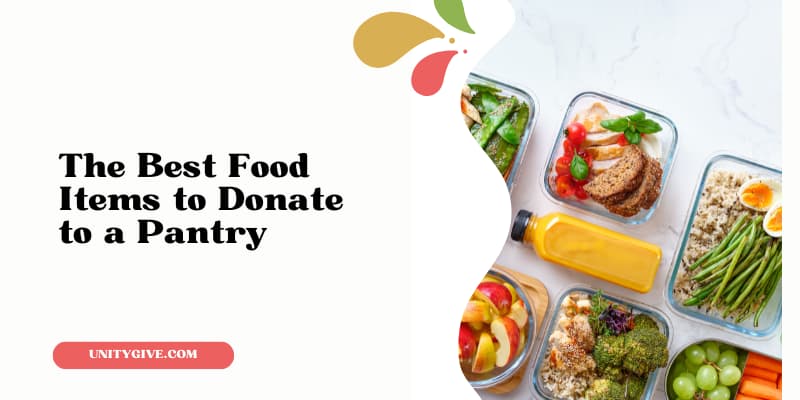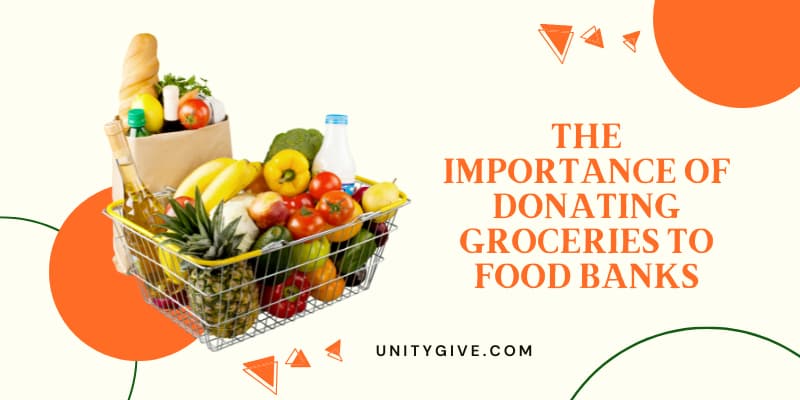Best Food Items to Donate to a Pantry: A Guide to Helping Those in Need
When it comes to giving back to the community, donating food is one of the most impactful ways to make a difference. Food pantries play a crucial role in providing nourishment to individuals and families facing food insecurity. Whether you’re cleaning out your pantry, hosting a food drive, or simply want to help those in need, it’s important to donate food that’s not only nutritious but also practical. In this blog, we will explore the best food items to donate to a pantry to ensure your contribution has the greatest impact.
Why Donating Food Matters?
Food insecurity affects millions of people worldwide, and food pantries work tirelessly to provide essential support to those who are struggling. Donations help these organizations keep their shelves stocked and provide nutritious meals to people who need them the most. However, not all food items are equally valuable to a food pantry. Donating the right types of food can help maximize the impact of your contribution and ensure the pantry can distribute food that is easy to store and prepare.
The Best Food Items to Donate to a Pantry
When choosing what to donate, it’s important to consider both the nutritional value and shelf life of the items. Here’s a list of the best food items that are always in demand at food pantries:
1. Canned Goods
Canned food is a pantry staple because it’s non-perishable, easy to store, and ready to eat. Some of the most requested canned items include:
- Canned vegetables and fruits: These provide essential vitamins and minerals.
- Canned beans and legumes: A great source of protein and fiber.
- Canned meats and fish: Tuna, chicken, or salmon are nutritious and can be used in a variety of dishes.
- Canned soups and stews: Easy to prepare, and they can serve as a full meal for many.
2. Whole Grains and Rice
Staples like whole grains, rice, and pasta are often requested because they are affordable, versatile, and provide lasting energy. Some excellent options to donate include:
- Brown rice: A healthier alternative to white rice with more fiber.
- Whole wheat pasta: A whole grain option that is rich in nutrients.
- Oats: Perfect for breakfast and can be used in various recipes.
- Quinoa: A gluten-free, protein-packed grain.
3. Peanut Butter and Nut Butters
Peanut butter and other nut butters are excellent sources of protein, healthy fats, and calories, making them a great donation for those in need. These items are typically well-loved due to their long shelf life and versatility.

4. Canned or Powdered Milk
Donating canned milk or powdered milk provides a long-lasting source of calcium and protein, which is especially important for growing children and the elderly. These milk options don’t require refrigeration and can be easily stored.
5. Cereal and Granola Bars
Breakfast items are always in demand, especially easy-to-prepare options like cereal and granola bars. They provide a quick, nutritious start to the day and are often preferred for their convenience. Look for whole grain cereals and granola bars with minimal added sugar.
6. Shelf-Stable Juices and Drinks
Juices and drinks are important for hydration and can provide essential nutrients. Donating 100% fruit juice or shelf-stable plant-based drinks (like almond or soy milk) can help supplement the diets of those who may not have access to fresh produce.
7. Baby Food and Formula
Parents facing financial hardship often struggle to provide enough nourishment for their babies. Donating baby food jars, baby formula, or diapers is always greatly appreciated by food pantries. These items are critical for the well-being of infants and toddlers.
8. Spices and Seasonings
Spices and seasonings may not always come to mind, but they are essential for making meals taste good, especially when resources are limited. A jar of salt, pepper, garlic powder, or cinnamon can go a long way in enhancing the flavor of otherwise basic meals.
9. Healthy Snacks
Snacks like nuts, trail mix, dried fruits, and granola are great to donate because they are high in energy and often favored by children. These can serve as nutritious alternatives to sugary processed snacks.
10. Flour and Baking Mixes
Baking items such as flour, cornmeal, and pancake mixes are always needed in food pantries. These ingredients allow families to make their own bread, pancakes, and other baked goods, which are both economical and satisfying.
What to Avoid Donating
While it’s great to give, some food items are less suitable for donations. Avoid donating:
- Perishable items that require refrigeration, such as dairy or fresh meats.
- Glass jars: They can break easily and pose a safety hazard.
- Expired items or food that is close to expiration.
- Pre-cooked or frozen meals, which may not have the proper storage facilities.
- Highly processed or unhealthy foods that are high in sugar, salt, or fat.
How to Ensure Your Donation is Helpful
To make your food donation as effective as possible:
- Check pantry needs: Some food banks may have specific lists of what they need most.
- Provide balanced donations: Aim to donate a variety of foods to help create well-rounded meals for families.
- Ensure freshness: Donate foods that are within their expiration date, and avoid donating damaged or open containers.
Conclusion
Donating food is an impactful way to help those in need, but it’s essential to contribute wisely. Focus on non-perishable, nutritious, and versatile items like canned goods, whole grains, and protein-rich foods. By donating these essential items, you’ll be helping to support food pantries in providing nutritious meals to individuals and families facing hunger. Your small gesture can make a big difference in someone’s life, ensuring they have access to the basic nourishment they deserve.
Read Also: How to Organize a Food Donation DriveFAQ’s: Best Food Items to Donate
1. What types of canned foods are best to donate?
Canned vegetables, fruits, beans, meats (like tuna), and soups are highly requested due to their long shelf life and ease of use.
2. Why should I donate whole grains instead of refined ones?
Whole grains, such as brown rice and whole wheat pasta, are more nutritious because they contain more fiber, vitamins, and minerals.
3. Can I donate baby food to a pantry?
Yes, baby food jars, baby formula, and diapers are always in demand and provide essential nourishment for infants.
4. Is it okay to donate snacks?
Healthy snacks like nuts, trail mix, and granola bars are a great choice as they provide energy and nutrition.
5. What should I avoid donating to a food pantry?
Avoid donating perishable items, glass jars, expired food, or unhealthy processed snacks. Always check for expiration dates and ensure items are unopened and in good condition.





